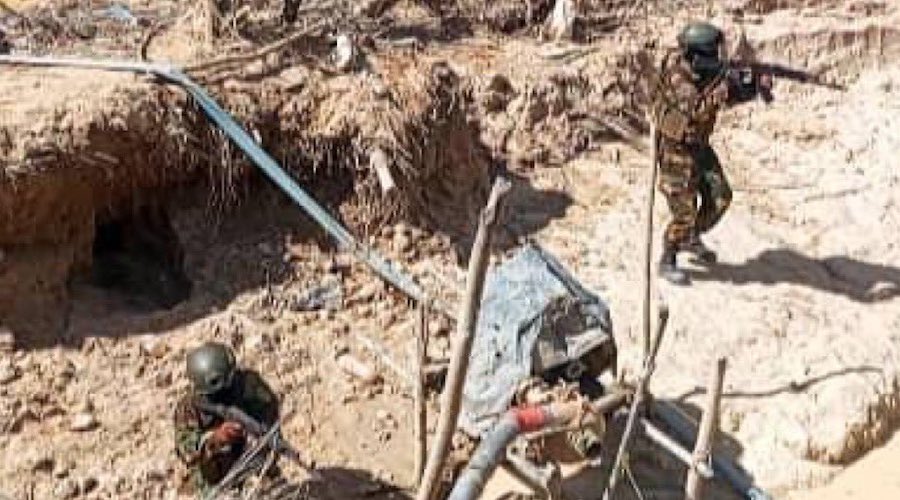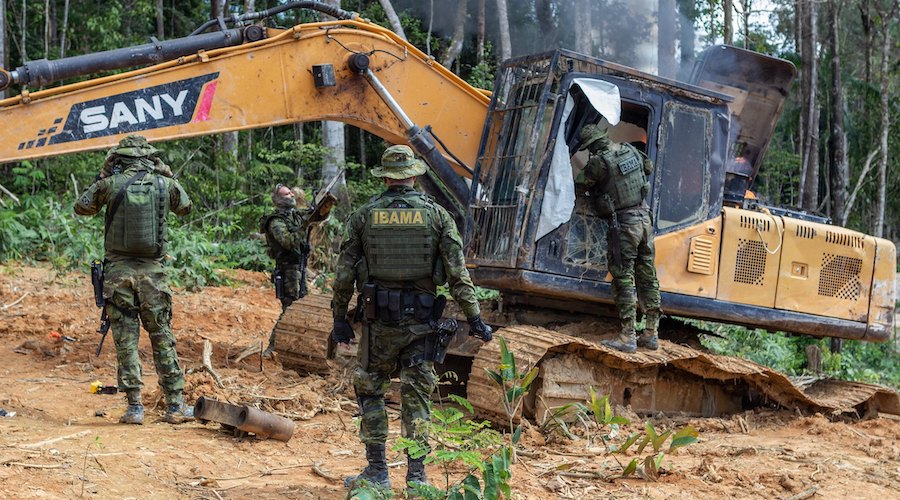Valentina Ruiz Leotaud | December 29, 2023 |

Operation against illegal mining in Venezuela. December 2023.
(Image by GJ. Domingo Hernández Lárez, X.)
The three most violent municipalities in Venezuela are located in the southeastern Bolívar state mining area, a new report by the NGO Venezuelan Violence Observatory (OVV) shows.

According to the document, the three municipalities in the state bordering Brazil registered 202 violent deaths in 2023. In detail, the municipality of El Callao registered 91 deaths, which is equivalent to a rate of 424.7 victims per one hundred thousand inhabitants in 2023. This makes it the most violent municipality in the South American country.
Next to El Callao are the Sifontes municipality, with the city of Tumemero as its main hotspot and a rate of 151 victims per one hundred thousand inhabitants, and the Roscio municipality with the city of Guasipati as its most dangerous place and a rate of 134 violent deaths per one hundred thousand inhabitants.
Many of the gold mining operations in the Bolívar state are unregulated and are threatening the health of several national parks, including Canaima, a UNESCO World Heritage Site.
In May of this year, the Venezuelan government deployed over 5,000 soldiers in the country’s national parks intending to evict criminal groups leading such illegal gold mining and drug trafficking operations.
During this campaign, which was carried out in tandem with the neighbouring Colombian armed forces, thousands of litres of fuel, hundreds of engines, rafts, pipes, processing plants, chemical agents, camping gear and other materials were destroyed.
But the military presence and actions did not put an immediate end to the activity. In September, a clash between soldiers and armed civilians operating illegal mines ended up with two people dead and six injured, while in early December, 12 people died when an artisanal gold mine near the town of Icabarú, also in the Bolívar state, collapsed.
Despite these results, the head of the government, Nicolás Maduro, said on December 28 in a televised address together with military personnel, that the armed operations allowed for the “peaceful liberation” of national parks and other protected areas from “predatory criminal mining.”
Overall, the year 2023 saw 6,973 violent deaths in Venezuela, 1,956 of which were victims of homicides committed by criminals, 953 deaths were caused by police actions and 4,064 violent deaths are still under investigation in terms of cause and intention.
The three most violent municipalities in Venezuela are located in the southeastern Bolívar state mining area, a new report by the NGO Venezuelan Violence Observatory (OVV) shows.

According to the document, the three municipalities in the state bordering Brazil registered 202 violent deaths in 2023. In detail, the municipality of El Callao registered 91 deaths, which is equivalent to a rate of 424.7 victims per one hundred thousand inhabitants in 2023. This makes it the most violent municipality in the South American country.
Next to El Callao are the Sifontes municipality, with the city of Tumemero as its main hotspot and a rate of 151 victims per one hundred thousand inhabitants, and the Roscio municipality with the city of Guasipati as its most dangerous place and a rate of 134 violent deaths per one hundred thousand inhabitants.
Many of the gold mining operations in the Bolívar state are unregulated and are threatening the health of several national parks, including Canaima, a UNESCO World Heritage Site.
In May of this year, the Venezuelan government deployed over 5,000 soldiers in the country’s national parks intending to evict criminal groups leading such illegal gold mining and drug trafficking operations.
During this campaign, which was carried out in tandem with the neighbouring Colombian armed forces, thousands of litres of fuel, hundreds of engines, rafts, pipes, processing plants, chemical agents, camping gear and other materials were destroyed.
But the military presence and actions did not put an immediate end to the activity. In September, a clash between soldiers and armed civilians operating illegal mines ended up with two people dead and six injured, while in early December, 12 people died when an artisanal gold mine near the town of Icabarú, also in the Bolívar state, collapsed.
Despite these results, the head of the government, Nicolás Maduro, said on December 28 in a televised address together with military personnel, that the armed operations allowed for the “peaceful liberation” of national parks and other protected areas from “predatory criminal mining.”
Overall, the year 2023 saw 6,973 violent deaths in Venezuela, 1,956 of which were victims of homicides committed by criminals, 953 deaths were caused by police actions and 4,064 violent deaths are still under investigation in terms of cause and intention.
Brazil cracks down as wildcat miners in the Amazon shift their operations
Reuters | December 28, 2023 |

Operation against illegal mining in Pará, Brazil.
Reuters | December 28, 2023 |

Operation against illegal mining in Pará, Brazil.
(Image by the Brazilian Institute of the Environment and Renewable Natural Resources IBAMA, Flickr.)
Deep in the Amazon rainforest, Brazil is fighting destructive wildcat gold mining as it spreads from Indigenous lands into government-protected conservation areas.

Federal Police have joined the government’s biodiversity conservation agency ICMBio on a series of recent operations to catch illegal gold miners and destroy their camps and equipment.
Leftist President Luiz Inacio Lula da Silva’s government has already been cracking down on mining on Indigenous reservations. But that has pushed some miners to other forests where there has been little enforcement.
This month, armed officers of ICMBio, a government agency named after murdered environmental activist Chico Mendes, swooped down in helicopters on wildcat camps in the upper reaches of the Tapajos, a tributary of the Amazon River.
They set fire to barges used to pump and filter ore, destroyed excavators and chainsaws, and seized weapons, radios and scales used by miners to weigh their gold.
Lula has vowed to stamp out illegal mining and end deforestation by 2030. That is a sharp reversal of policy from his predecessor Jair Bolsonaro, who was criticized globally for relaxing environmental controls, giving illegal loggers and miners free range in the Amazon. He argued that Brazil had the right to develop its natural resources.
On one recent mission, a Reuters photographer followed an ICMBio team into the Urupadi National Forest where agents detained a handful of wildcat miners and destroyed their tents, excavators, dredging equipment and fuel supplies.
The miners had cut down swathes of jungle and dug dozens of ponds to dredge for gold that they separated from sand and ore with mercury, a contaminant that poisons fish in the rivers.
Through the open door of their incoming helicopter, the ICMBio agents fired automatic weapons at motor boats carrying fleeing miners. They fired again to blow up barrels of diesel fuel and set fire to excavators so they could not be used again.
“We destroy their camps and they keep coming back,” said mission commander Sidney Serafim.
During a three-week operation, the agents found 20 mining sites and 11 clandestine airstrips in the forest, along with kilos of mercury and thousands of liters of diesel.
Detained miner Fabio Santos said he had worked prospecting for gold in Munduruku territory further along the Tapajos river, but had moved out due to law enforcement missions and conflict with the Indigenous people.
“We thought it would be quieter here. Bolsonaro did not destroy our equipment,” he said.
“Things are going downhill with the new government,” said another miner, Ramon Marques. “God left the gold here for us to enjoy it,” he added.
The men were set free into the jungle on foot. Only the manager of one of the wildcat mining sites, Manuel de Jesus Silva, was taken into police custody.
He ran a store in a wooden shack where he sold canned food and liquor to the miners for grams of gold, and had a snooker table outside for them to play.
“I used to make 200 grams a month, but in the last two months I got just 100 grams,” Silva complained.
(By Adriano Machado and Anthony Boadle; Editing by Rosalba O’Brien)
Deep in the Amazon rainforest, Brazil is fighting destructive wildcat gold mining as it spreads from Indigenous lands into government-protected conservation areas.

Federal Police have joined the government’s biodiversity conservation agency ICMBio on a series of recent operations to catch illegal gold miners and destroy their camps and equipment.
Leftist President Luiz Inacio Lula da Silva’s government has already been cracking down on mining on Indigenous reservations. But that has pushed some miners to other forests where there has been little enforcement.
This month, armed officers of ICMBio, a government agency named after murdered environmental activist Chico Mendes, swooped down in helicopters on wildcat camps in the upper reaches of the Tapajos, a tributary of the Amazon River.
They set fire to barges used to pump and filter ore, destroyed excavators and chainsaws, and seized weapons, radios and scales used by miners to weigh their gold.
Lula has vowed to stamp out illegal mining and end deforestation by 2030. That is a sharp reversal of policy from his predecessor Jair Bolsonaro, who was criticized globally for relaxing environmental controls, giving illegal loggers and miners free range in the Amazon. He argued that Brazil had the right to develop its natural resources.
On one recent mission, a Reuters photographer followed an ICMBio team into the Urupadi National Forest where agents detained a handful of wildcat miners and destroyed their tents, excavators, dredging equipment and fuel supplies.
The miners had cut down swathes of jungle and dug dozens of ponds to dredge for gold that they separated from sand and ore with mercury, a contaminant that poisons fish in the rivers.
Through the open door of their incoming helicopter, the ICMBio agents fired automatic weapons at motor boats carrying fleeing miners. They fired again to blow up barrels of diesel fuel and set fire to excavators so they could not be used again.
“We destroy their camps and they keep coming back,” said mission commander Sidney Serafim.
During a three-week operation, the agents found 20 mining sites and 11 clandestine airstrips in the forest, along with kilos of mercury and thousands of liters of diesel.
Detained miner Fabio Santos said he had worked prospecting for gold in Munduruku territory further along the Tapajos river, but had moved out due to law enforcement missions and conflict with the Indigenous people.
“We thought it would be quieter here. Bolsonaro did not destroy our equipment,” he said.
“Things are going downhill with the new government,” said another miner, Ramon Marques. “God left the gold here for us to enjoy it,” he added.
The men were set free into the jungle on foot. Only the manager of one of the wildcat mining sites, Manuel de Jesus Silva, was taken into police custody.
He ran a store in a wooden shack where he sold canned food and liquor to the miners for grams of gold, and had a snooker table outside for them to play.
“I used to make 200 grams a month, but in the last two months I got just 100 grams,” Silva complained.
(By Adriano Machado and Anthony Boadle; Editing by Rosalba O’Brien)
No comments:
Post a Comment